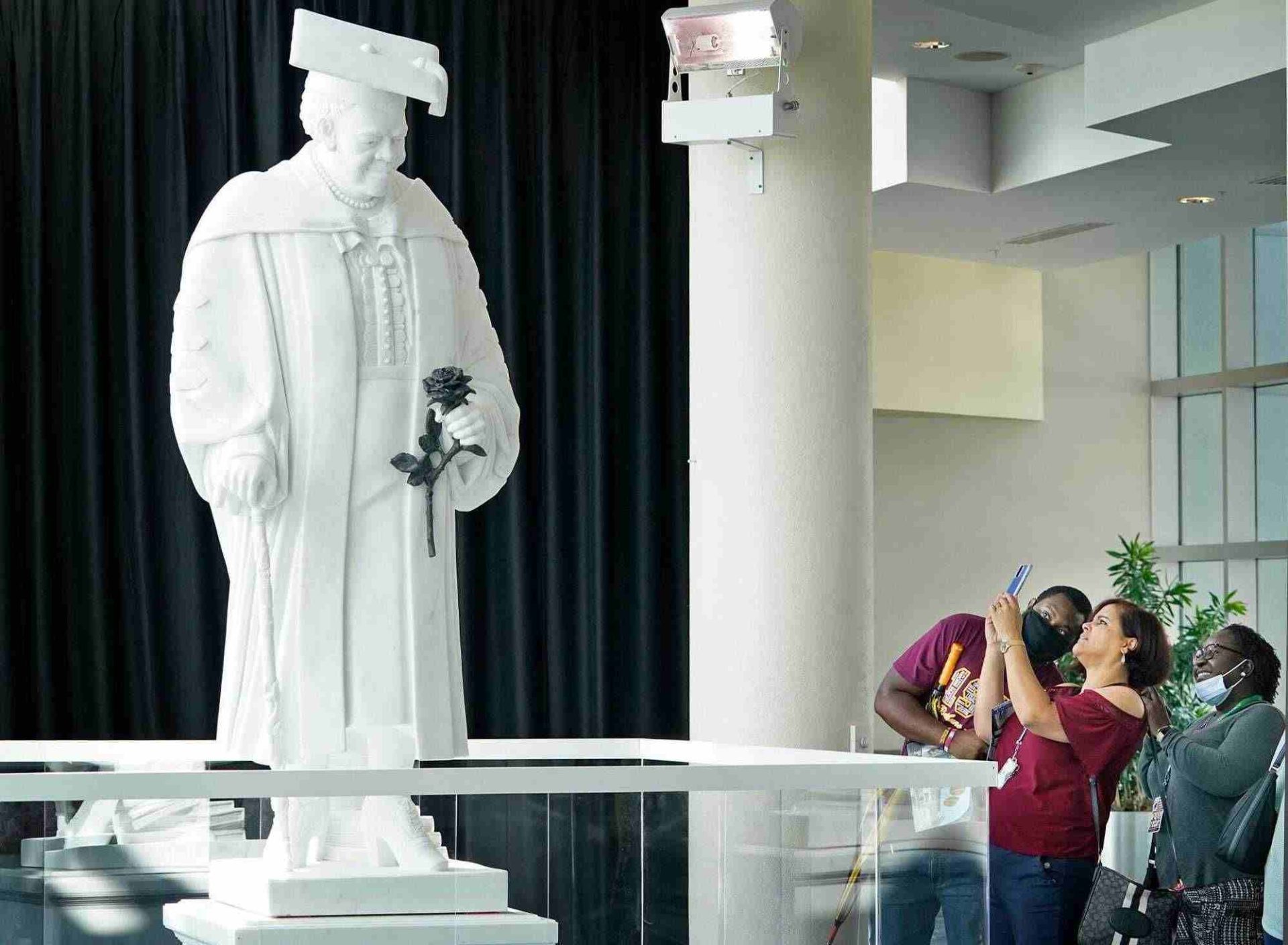As a result of her contributions to education and civil rights, Mary McLeod Bethune became the first Black American to be recognised with a state statue in National Statuary Hall, the Capitol’s main chamber.
After serving as an advisor to Franklin D. Roosevelt, Bethune became a champion for the rights of African-Americans from the schoolhouse to the White House. Bethune-Cookman University, a historically black college in Daytona Beach, Fla., was established by her with $1.50.
It was “poetic” for Bethune’s image to replace that of Edmund Kirby Smith, who was one of the final Confederate generals to surrender after the war ended in 1865, according to House Speaker Nancy Pelosi, who attended the dedication event.
In 2021, his statue was taken down. Rep. Pelosi termed it “changing a traitor for a civil rights hero.”
Last year, the House of Representatives decided to remove from the Capitol grounds sculptures commemorating Confederate generals and other white supremacists. This law and others like it are part of a long-running dispute over the removal of monuments and the renaming of buildings, roadways, and colleges that honour racists. Some critics argue that we should instead honour those who made significant contributions to the fight for equal rights.
According to Lawrence M. Drake II, interim president of Bethune-Cookman Institution, Bethune’s impact is evident in the university she managed for 30 years. According to him, she used the notion of “experiential education,” which mixes hands-on experiences with academic content, in her work as an educator.
Today, “our hearts are glad to see our founder and namesake assume her proper position among the most illustrious Americans,” he remarked.
Bethune is shown with graduation regalia and a hat with books in the white marble statue, which was sculpted in the same quarry as Michelangelo’s David. One of her former pupils previously characterised it as a sign of acceptance of students’ uniqueness, and that is what she is holding in her hands now. She also has a cane in her other hand, a gift from Roosevelt.
One of her most well-known quotations is on the plaque: “Invest in the human spirit. In the end, “Who knows? It may be a gem.”
First Hispanic sculptor to produce sculpture for National Statuary Hall is Nilda Comas, who is located in Fort Lauderdale, Florida. Statuary Hall, an elegant amphitheater-style space directly off the House floor or somewhere in the Capitol, is where each state sends two statues of distinguished persons to represent it.
Rep. Steny H. Hoyer, a Maryland Democrat and the majority leader, said last year, “We can’t rewrite history, but we can make it clear what we cherish and what we don’t celebrate. There is no place in the halls of Congress for symbols of hatred and division.
New Jersey Democrat Senator Cory Booker presented legislation last year to remove Confederate sculptures from the Capitol’s public display, but it never moved.
There must be a state legislature and governor’s permission before a statue may be removed or replaced. Bethune’s legacy was kicked off by Florida’s Republican Senator Rick Scott, a former governor of that state.
Rep. Val Demings (D-FL) spoke about her parents’ teachings regarding Bethune’s public service legacy at the event. Honorary doctorate awarded by Bethune-Cookman University to Ms. Demings, who says she still admires her.
‘Her work of love could not be encompassed in her years on this world,’ Ms. Demings said of her mother. She lacked fearlessness and guts. However, despite the highs and lows of her journey, Dr. Mary Bethune never wavered.
As the daughter of previously enslaved people, Bethune was born in 1875 and “became one of the most influential Black educators, civil and women’s rights activists and government officials of the twentieth century.
When she and her family ultimately relocated to Palatka, in northern Florida, she and her husband Albertus Bethune were able to raise their son. Bethune founded a boarding school in 1904 with a budget of $1.50 and a student body of only five after the dissolution of her marriage. Bethune-Cookman College was established in 1931 and renamed Bethune-Cookman University in 2007.
With the National Association for the Advancement of Colored People (N.A.A.C.P.) and the United Nations, she helped eradicate racial prejudice and lynching.
When Franklin D. Roosevelt appointed Bethune in 1936 to be the National Kids Administration’s lead person for African-American youth, she became the nation’s highest-ranking Black official. According to the National Women’s History Museum, she was also a leader of his unofficial “Black cabinet” and was acquainted with Eleanor Roosevelt.
Representative Frederica S. Wilson, a Democrat from Florida, said during the event that Bethune strove to convince Americans that black lives mattered. Ms. Wilson recalled how Bethune, who grew up labouring in the fields, came to understand the need of a college degree for both her own future and the future generations to come.
Among her 17 siblings, Bethune was the only one who was able to read at an early age.
According to Ms. Wilson, “we are rewriting the history we wish to share with our future generations” now. A sign of optimism and inspiration is taking the place of a residue of hate and separation.
In 1954, the year before she died, Bethune wrote a “last will and testament” essay in which she discussed the legacy she wished to leave for future generations. At the event, several of the speakers made mention to it.
“My concept of living and serving is the legacy I want to give my people,” she wrote. In the face of tomorrow, I am certain that my life has been well-spent. Those who believe in a world of peace, growth, fraternity, and love may benefit from my philosophy today.
